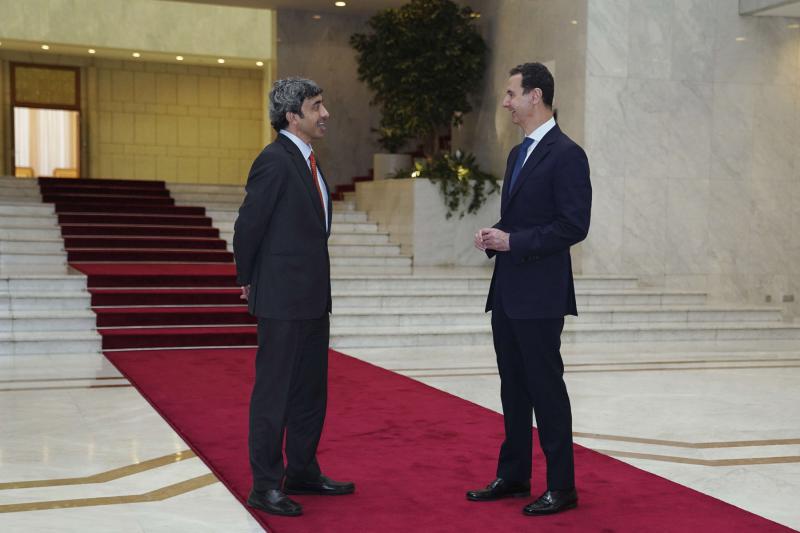These warming ties come as a day before the UAE top diplomat's visit, the American Senator James Risch, of Idaho, had warned the Emirates against cozying up to Damascus. However, it seems that the Americans are just issuing warnings, and in action, they are not interested to take concrete steps against the UAE for its closeness to the Syrian government. Over the past two years, some Arab allies of the Washington have dreamed restoring their role in Syria via stretching a hand of friendship to President al-Assad. This new Arab agenda is being adopted whole such countries as the UAE, Qatar, Saudi Arabia, and Bahrain staunchly supported armed opposition and terrorist groups fighting Damascus government in the devastating Civil War since 2011. However, since 2019, they revised their policy and shifted from hostility to intimacy to Damascus.
On the other hand, in response to the Arab countries’ approach to Syria, Washington can take action against the UAE government by referring to its sanctions framework known as Caesar Act, which imposes sanctions on countries and individuals that deal with the Syrian government. But the Americans have so far only stopped at verbal warnings, because Washington knows that if it wants to punish the UAE for its proximity to Syria using Caesar Act, it will actually alienate UAE away and the cost of this will be much higher or Washington than its benefits. Therefore, they prefer just to issue verbal warnings regarding the UAE’s approach to Syria, and in practice, their hands are not wide open to act against their allies in Abu Dhabi and elsewhere.
A bargaining chip
Continuation of relationship with Syria despite the Americans warnings demonstrates that the Emirates leaders have no intention to back down. Andreas Krieg, a senior lecturer at the School of Security Studies at King’s College London, believes that maintaining close ties with Damascus shows that the UAE plans to hold this relationship as a bargaining chip against the US.
Krieg also points out that the UAE is trying to strengthen its position as a middle power in the region with close relations with Syria. For Abu Dhabi, Syria has a networking advantage, which means that its close relations with Syria will simultaneously strengthen the UAE’s position among the anti-Western and anti-Israel bloc in the region. Since its normalization with Israel in 2020, the UAE has been accused of making compromises to Tel Aviv and undermining the rights of Palestinians, but now that it builds closer ties to Syria, it hopes to maintain its position among the anti-Israeli countries. Syria is one of the leading countries in the region in opposition to Israel and brings the advantage for the Emiratis.
Arab rulers afraid of being marginalized in Syria
The Emiratis are still pushing to paint themselves as the leading role player in post-war Syria and so are not interested to scale down their closeness to the Syrian government.
Indeed, it is not just the rivalry with other Arab countries that makes the Emiratis rebuild damaged ties to Damascus. Actually, Abu Dhabi and others like Riyadh, Doha, and Manama know that with regard to their anti-Syrian militias last decade, they left the game to Iran and Syria that unwavering stayed with the Syrian government to the last day of conflict. To be precise the Arab rulers feel marginalized in Syria compared to Moscow and Tehran.
The UAE is trying to restore its past position in Syria now that the situation in the war-ravaged country is moving towards normalization, and the same effort is being made by the Bahrainis. Even the Qataris, after Turkey softened its tone against President al-Assad, no longer have the hard-line positions of the past against Syria, and the Qatari emir is waiting for the right time to return to Syria. Last year, Radio Free Europe, quoting its sources, reported moves by Saudi Arabia and Syria to restore relations. Knowing that other Arab states are moving towards the normalization of the situation with the Syrians, the UAE is speeding up its efforts to regain its foothold in the developments in Syria sooner than other Persian Gulf Arab sheikhdoms. With this in mind, it is not surprising that the UAE decided to reopen its embassy in Damascus in 2018, and very quickly, Emiratis, especially in the financial and commercial sectors, became active again in Damascus.
Dubai significance for Damascus
It is not just Emirates that seek to restore ties to al-Assad government, and the Syrian government which has been under strict sanctions over the past decade finds return of the UAE a good opportunity for Syrian comp died to return to Dubai as a major regional trade hub.
Dubai port with a distinguished commercial and economic role can
substantially help the Syrian government and companies to circumvent the
American sanctions. Therefore, Damascus warmly welcomes UAE return,
hoping that it can help evade the unilateral American sanctions.
/129

